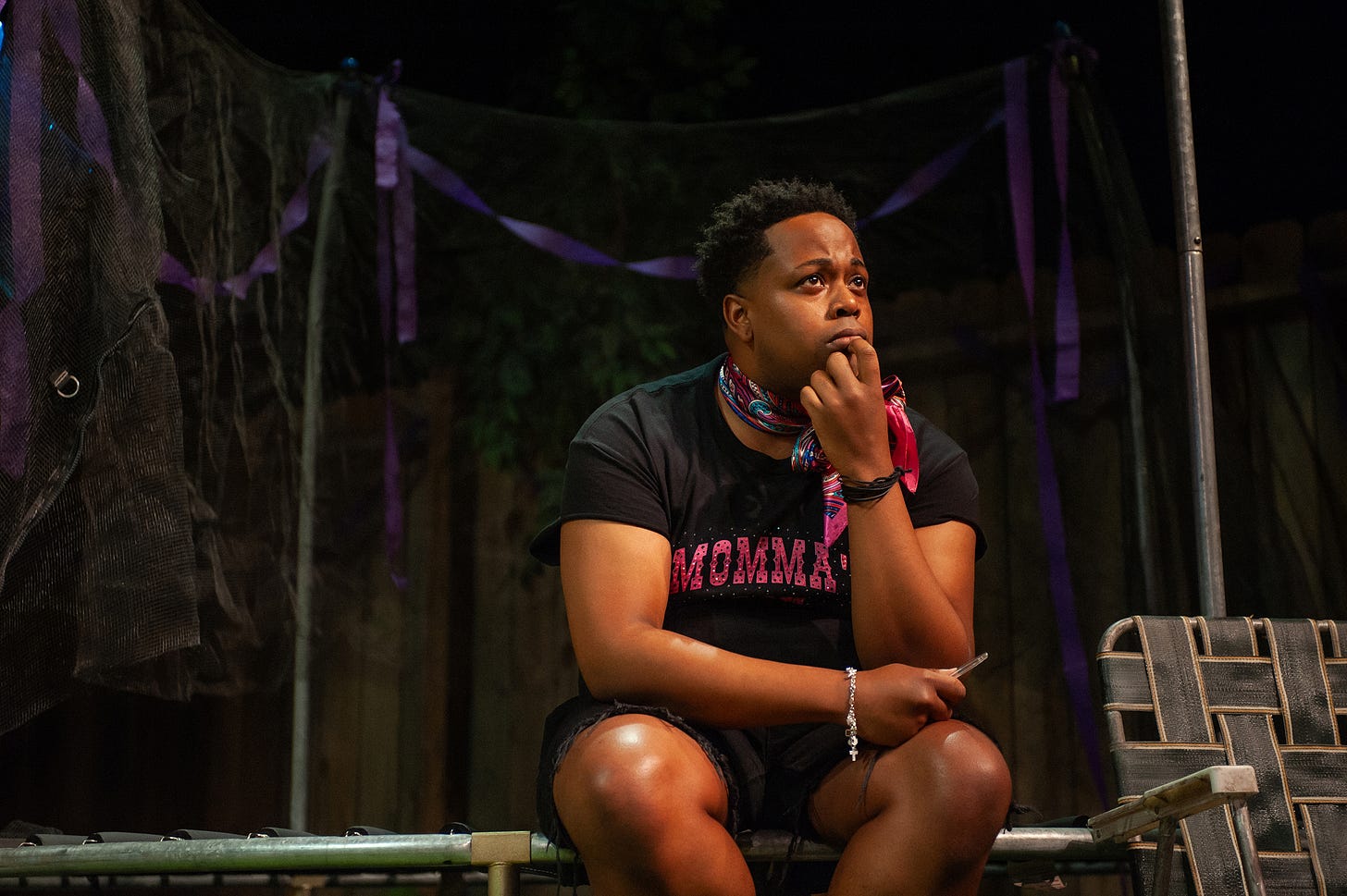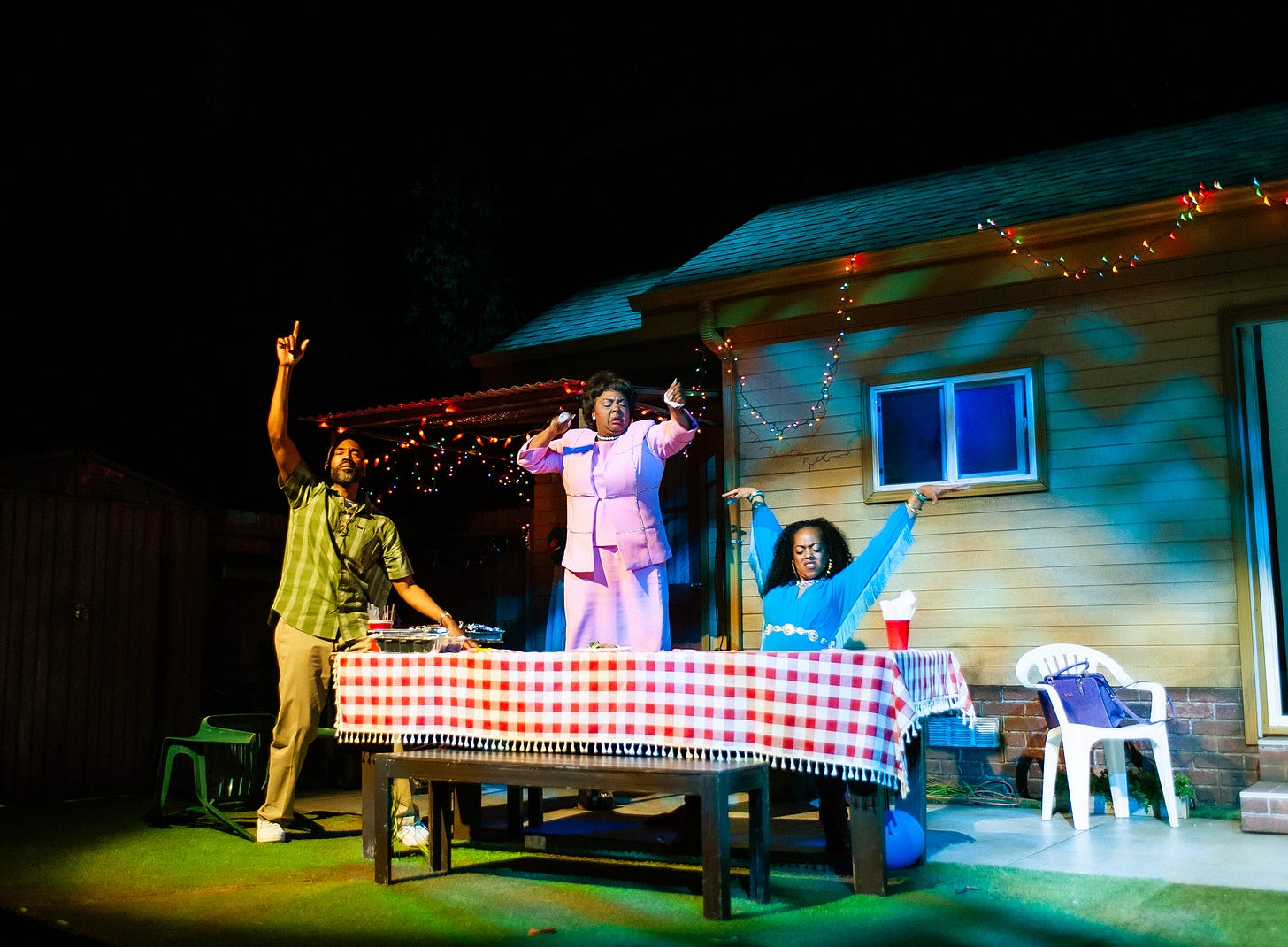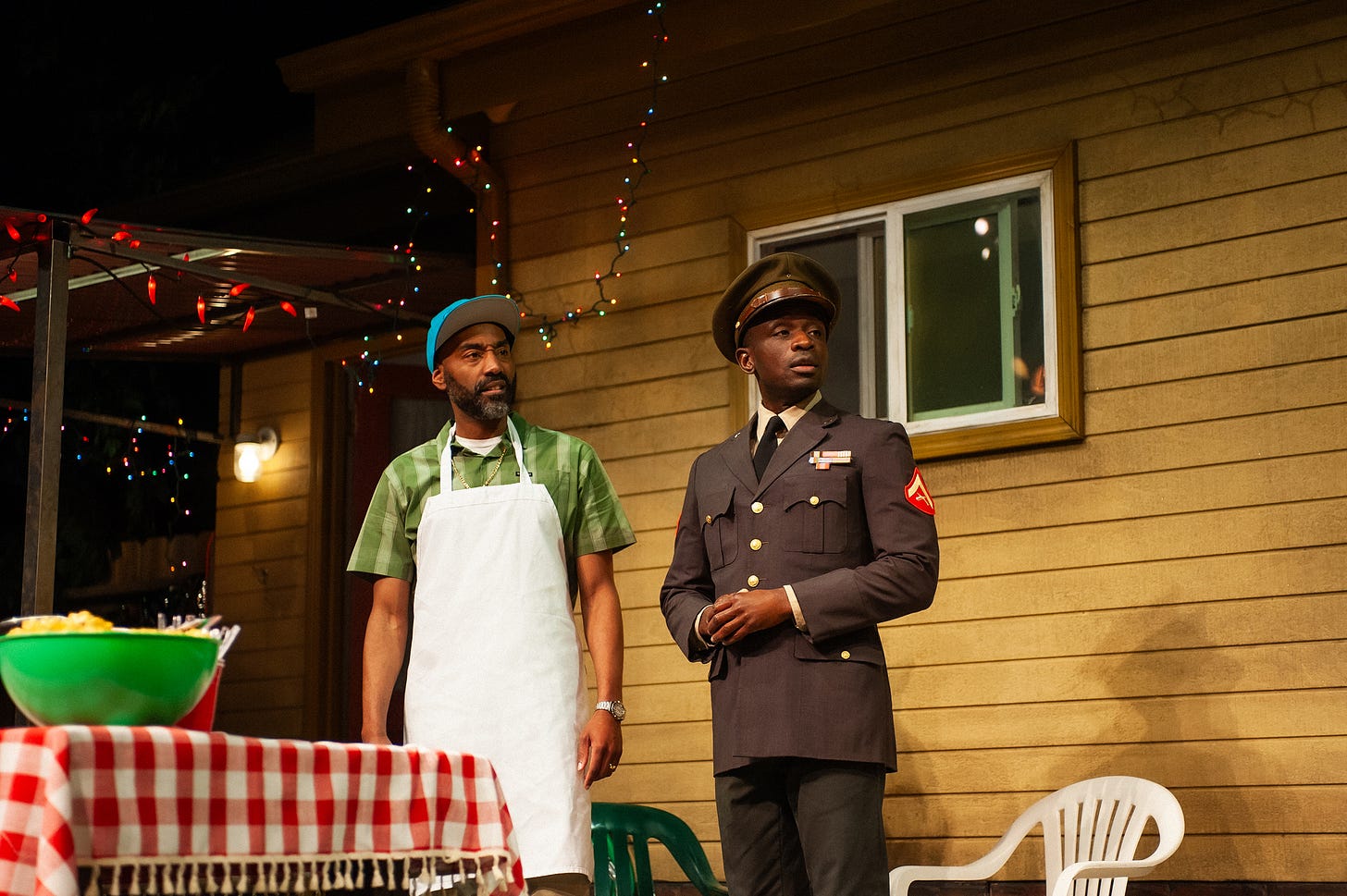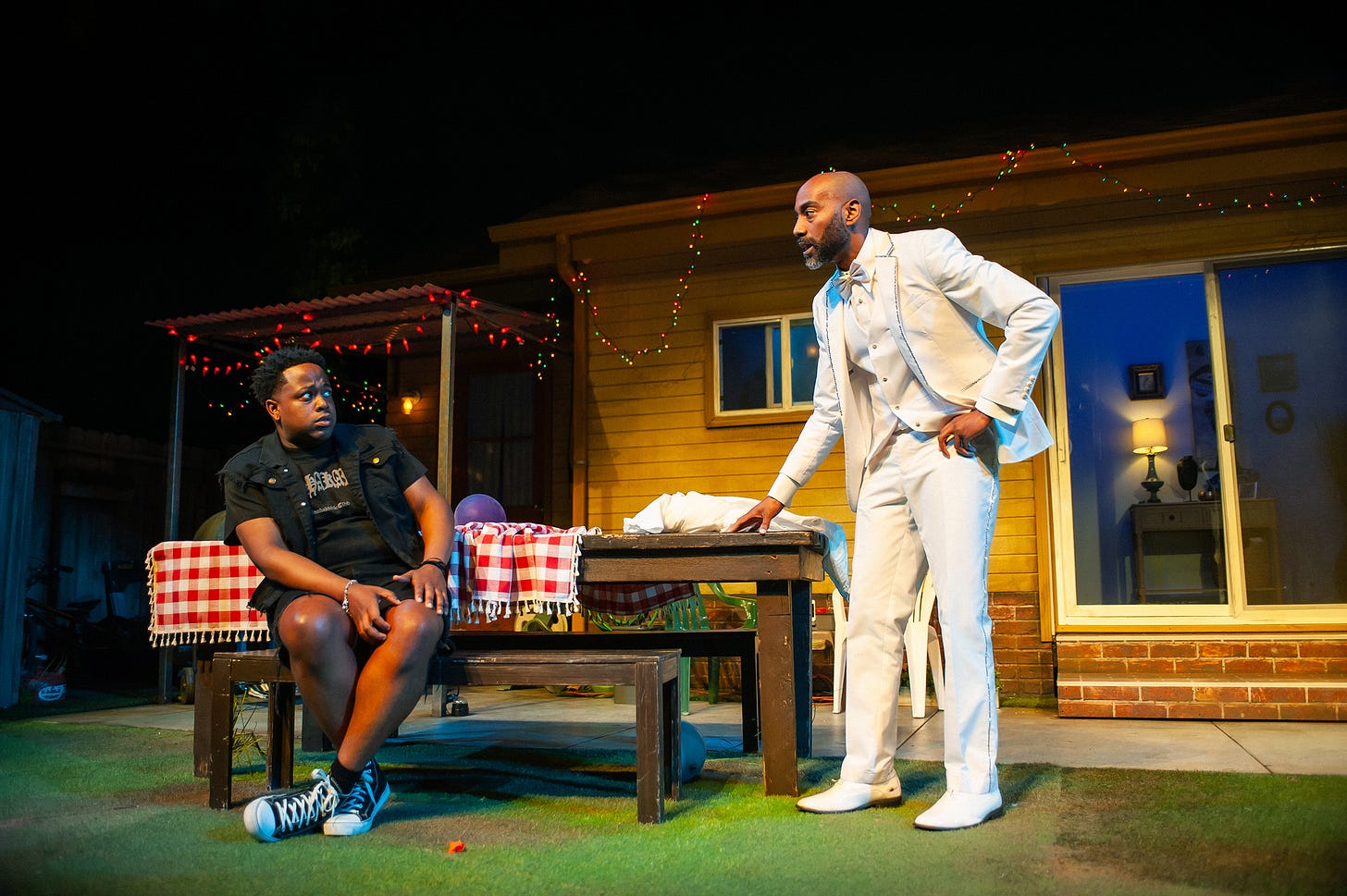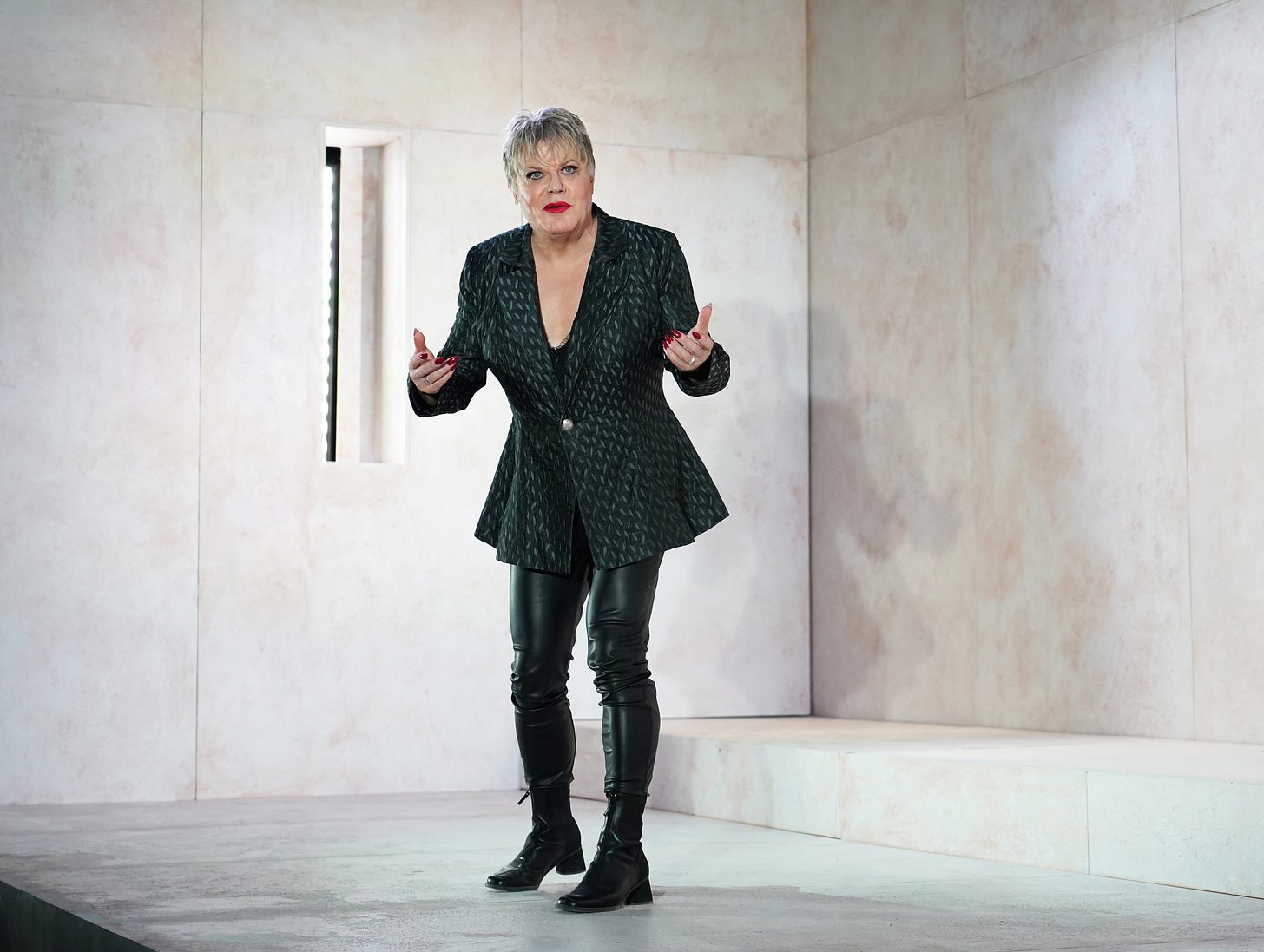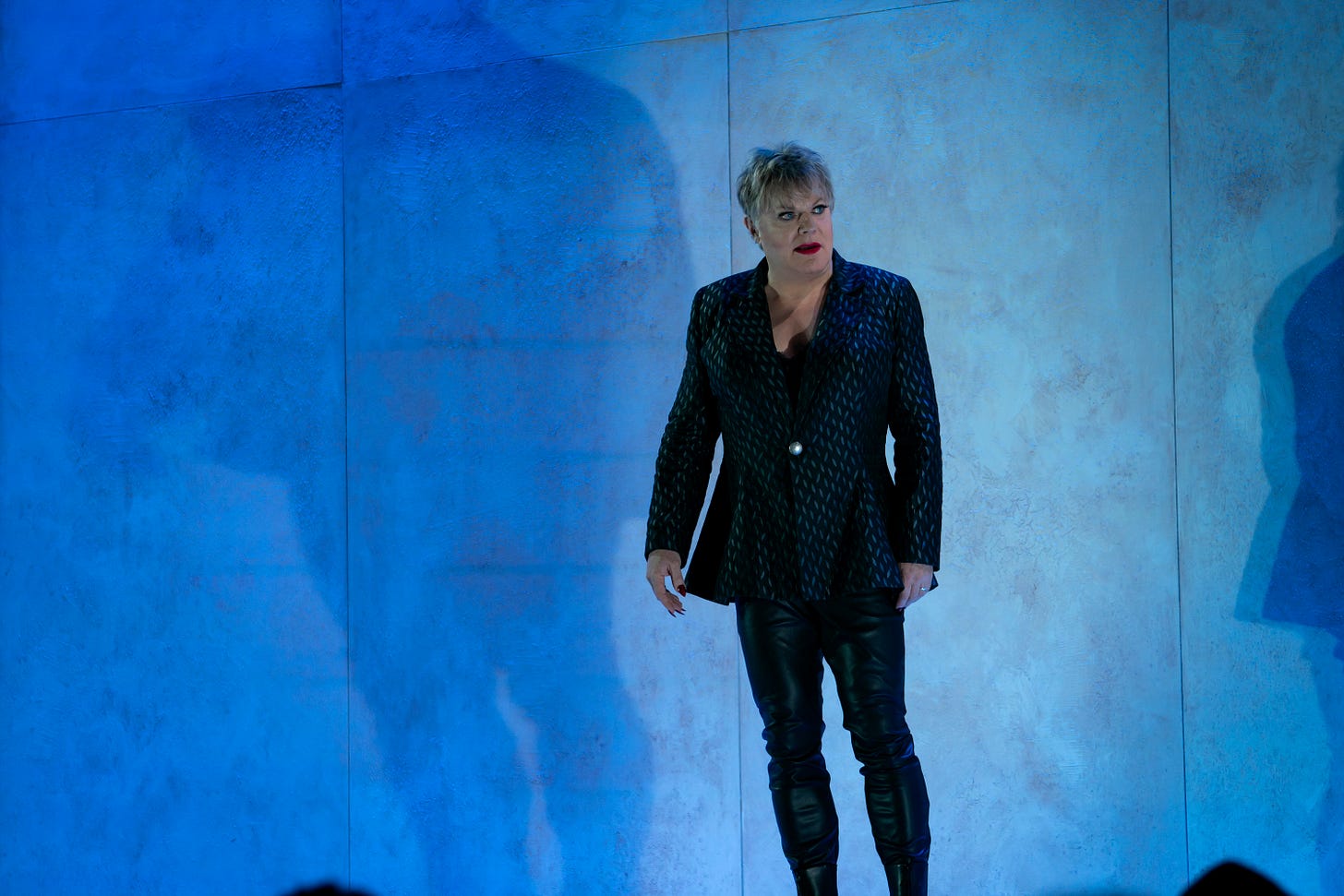Hamming it up
Two contrasting visions of Shakespeare’s Danish tragedy wound up in a similar place

Last Wednesday night, April 2, I went to the theater to see a gimmicky, high-concept take on Hamlet whose fundamental unsteadiness was redeemed in large part by the contributions of an enormously skillful cast. The following night, I went to the theater to see a gimmicky, high-concept take on Hamlet whose fundamental unsteadiness was redeemed in large part by the contributions of an enormously skillful cast.
Coincidence? If you say so. It all felt a bit Twilight Zone to me.
When people say there are countless ways to do Hamlet, they generally mean settling on answers to traditional dramaturgical questions like Is Hamlet just irresolute or is he biding his time? or What’s the thematic import of suicide? or What is Ophelia’s deal anyway? They’re less likely to have in mind a notion like reimagining the play’s characters and setting in the context of the contemporary African American south, as James Ijames’ 2021 Pulitzer Prize-winning Fat Ham does. And it’s not much more likely that anyone envisions entrusting the entire text of Shakespeare (give or take) to a single performer, which is what happens in comedian and actor Eddie Izzard’s touring solo show.
But sure, what the hell. Shakespeare’s work is unimaginably rich and fertile, and there’s no reason not to hold it aloft at every conceivable angle and shake it until the goodies fall out. Try it this way, that way, the other way. All I ask is some kind of payoff, and that’s where both of these undertakings fell short.
Still, let’s acknowledge right out of the gate that the production of Fat Ham at San Francisco Playhouse is uproariously entertaining throughout. From one line to the next, Ijames writes with a beautiful ear for conversational give and take — now adversarial, now collaborative — and for the power struggles and shifting allegiances that dialogue can mask. The script is outrageously funny, with a profane, electrifying energy that sometimes seems to dare you not to laugh, and Ijames operates in several different comic modes at once. Some of his jokes, like grafting “ay, there’s the rub” onto a discussion of barbecue flavor, are so obvious and dumb you have to laugh in spite of yourself; others, like an extended soliloquy about getting a blowjob from a VR gingerbread man, achieve a maniacal grandeur that becomes more and more astonishing with each new twist.
And the San Francisco cast, dexterously directed by Margo Hall, is nothing short of breathtaking. There are seven actors in the company, each of them operating at an extraordinary level of theatrical virtuosity. Ron Chapman doubles as Rev and Pap (Hamlet’s uncle and dead father, respectively), bringing to both characters a degree of toxic masculinity so malignant it feels physically scary to be in the same room with either of them. Jenn Stephens, as Hamlet’s mother, creates a big, ambiguous whirlwind of vanity, heedlessness, and maternal concern, while Phaedra Tillery-Boughton, as a screechy church lady with a checkered past, garners laughs just by planting herself on the stage and giving you that look. Another one of the cast members gives a performance so unsuspectedly brilliant that even to name them would constitute a spoiler. And the soft nougaty center of the confection is Devin A. Cunningham as Juicy — Fat Ham himself — whose version of Hamlet’s indecisiveness is to mumble and wheedle and sort of ooze around a stage on which every other actor is operating at all times in razor-sharp relief.
At a certain point, though — fairly early in the proceedings, in fact — it becomes clear that none of these moments of individual radiance really connect with one another, or cohere into any kind of consistent narrative. Fat Ham isn’t about anything; it’s like a collegiate sketch show put together by a team of impossibly gifted undergraduate gag writers. Ijames sets the action at a barbecue to celebrate the wedding of Rev and Tedra (Claudius and Gertrude), so guests come and go, and there are little face-offs and mini-conspiracies and then it’s on to the next thing. When Ijames can’t think of anything for a character to do for a while, he sends them off to Walmart to pick up beer; when things get really becalmed, he’ll go meta with a quotation from Shakespeare.
But in the end, Hamlet doesn’t provide much more than a rudimentary plot premise (my uncle killed my dad and married my mom) and some character names, which leaves both playwright and audience scrambling for a dramatic focus. The play includes not one, not two, but three abrupt comings-out, which is a lot of gay — and, more to the point, not something you need Hamlet for (especially in a version that doesn’t care about Rosencrantz and Guildenstern). The ambiguity of Gertrude’s role as a mother and a sexual being is always interesting, but Ijames doesn’t add anything to Shakespeare on this point. Perhaps the most compelling twist is the reimagining of the dead father as an abusive tyrant — except that that gives Juicy even less motive for revenge than Hamlet ever had.
For all its surface allure, Fat Ham amounts to a series of questions asked and never quite answered. “What if Hamlet but Black?” “What if Hamlet but gay?” “What if Hamlet but hilarious?” I don’t know…what? You tell me.
Fat Ham: San Francisco Playhouse, through April 19. www.sfplayhouse.org.
Elsewhere:
Steven Winn, San Francisco Chronicle: “With its convulsive action, bursts of torrential language, family feuds, one achingly tremulous love scene and a starburst finale, playwright James Ijames’ 2022 Pulitzer Prize winner doesn’t so much reframe the Bard’s drama of a young man’s paralyzing malaise in a working class Black idiom as turn it inside out.”
David John Chávez, Mercury News: “There is so much to love about this production. Hilarity, memorable characters, and touches that have Juicy move from common prose directly into Shakespeare’s meter are an embarrassment of riches.”
Ham Solo
Like Fat Ham, Eddie Izzard’s solo Hamlet — presented here by A.C.T. at the Strand Theater — is studded with individual moments of delight that never reveal a greater purpose. Just to review the situation: In this production, the incendiary and versatile comedian and actor (who now prefers she/her pronouns) performs every role in the play, from Hamlet and Ophelia and Laertes down to Osric and both gravediggers. Now, you might be thinking, wait, does that mean Izzard does that thing of quickly jumping back and forth to simulate two people having a conversation? And the answer is yes, indeed she does. It’s a hilarious technique when she wants to dramatize the processes of global colonial conquest; when it comes to Hamlet and Gertrude hashing things out, it’s rather less fruitful.
We don’t know how this project got off the ground, but I can make a pretty good guess. Izzard and her collaborators, including her brother Mark Izzard (credited with the adaptation), were brainstorming one day. Someone said, “Maybe Eddie should perform the entire text of Hamlet solo,” and someone else said, “Great idea,” and then someone said, “OK but why though?” And just at that very moment the pizza delivery arrived, and the next thing anyone knew the tour had been booked and they’d completely forgotten to come up with an answer to that all-important question.
I don’t know how else you can explain it. If you must entrust all of Hamlet to a single performer, I suppose Izzard isn’t a bad choice, up to a point. Her diction is exquisite; she gives every line in the play a weight, a shape, a presence that is full of dramatic nuance; she commands the entire play in the synoptic way a great performer must. On the other hand, with a few exceptions, she doesn’t do much to distinguish the characters from one another. The Ghost does have a shivery, disembodied quality when he speaks. But Hamlet, Gertrude, Laertes, even old Polonius all sound like Eddie Izzard.
Above all, I’m not prepared to concede the underlying premise. Izzard’s Hamlet is a pointless challenge, skillfully achieved for no discernible purpose.
Unsurprisingly, perhaps, the most satisfying parts of the experience are the soliloquies; at its best, this Hamlet includes some of the finest audition excerpts you will witness. “To be or not to be” emerges as a small oratorical masterpiece blending artifice with probing naturalism; “O, that this too too solid flesh” is shot through with mournful self-knowledge. And there are brief moments throughout when Izzard’s comedic genius redeems the futility of the enterprise. Just before the curtain rises on the play-within-a-play, for instance, Hamlet says, “I must be idle,” and Izzard leans against the nearest wall with fastidiously staged insouciance, giving a low whistle. If only it had all been like that — more art with less matter.
Hamlet: American Conservatory Theater’s Strand Theater, through April 20. www.act-sf.org.
Elsewhere:
Lily Janiak, San Francisco Chronicle: “One good thing about Eddie Izzard’s one-person Hamlet is that it suggests how great Izzard … would be in pretty much anything that’s not a one-person Hamlet.”
Jean Schiffman, Bay City News: “But if Izzard is not consciously following the wise advice to the Player King, she has not found a way to internalize, well, anything: not Ophelia’s broken heart and descent into madness, nor Queen Gertrude’s confusion and horror, nor King Claudius’ wrenching confession, nor, most egregiously, Prince Hamlet’s existential angst, inner conflict and rage.”
Cryptic clue of the week
From Out of Left Field #262 by Henri Picciotto and me, sent to subscribers last Thursday:
Levy and I get a cab (4)
Last week’s clue:
Fruit liqueur, at first, is bluish gray (5)
Solution: PEARL
Fruit: PEAR
liqueur, at first: L
bluish gray: definition
Coming up
• Leah Crocetto: The powerhouse soprano, who hasn’t been heard much locally since launching her career with the San Francisco Opera a decade ago, returns to conclude the season of the Schwabacher Debut Recitals. Her program with pianist Carrie-Ann Matheson (whose day job is artistic director of the San Francisco Opera Center and the Merola Opera Program) promises music by Clara Schumann, Richard Strauss, Stephen Sondheim, and more. April 10, Taube Atrium Theater. www.sfopera.com.
• SoundBox: Percussion music is about banging on things, and what better to bang on — sorry, percuss — than sculpture? The inventive percussionist and composer Andy Akiho takes on the latest installment of the San Francisco Symphony’s experimental music series SoundBox in a collaboration with sculptor Jun Kaneko. April 11-12, SoundBox. www.sfsymphony.org.
• Owls: The traditional makeup of the string quartet has been such a fixed standard for centuries that it’s easy to lose sight of other possibilities. The inventive chamber ensemble Owls proposes a simple, provocative alternative: why not two cellos instead of two violins? The group’s Berkeley program includes works by Paul Wiancko (one of the two cellists), as well as music by Chick Corea, Terry Riley, and more. April 13, Hertz Hall, UC Berkeley. www.calperformances.org.




